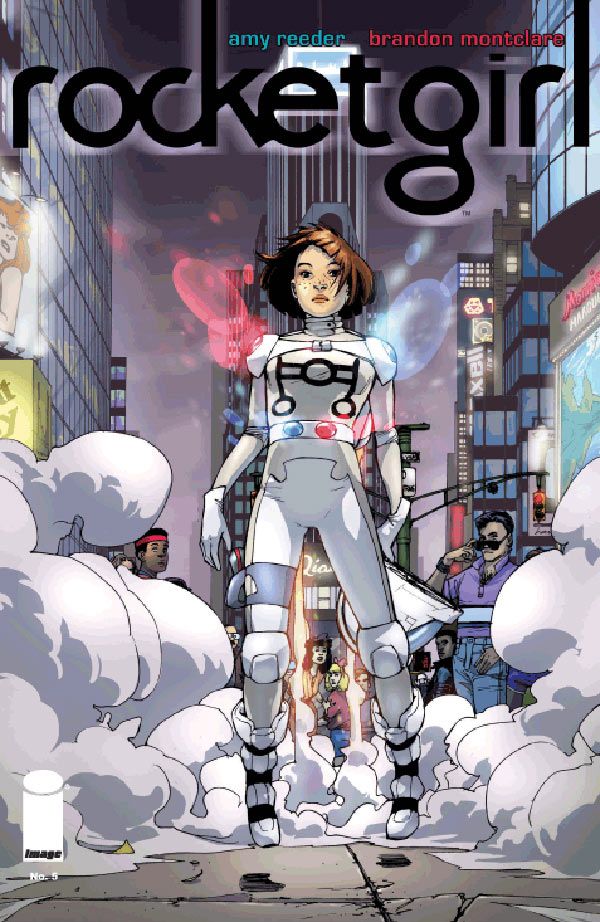In the last issue before its long summer break, Brandon Montclare and Amy Reeder's "Rocket Girl" has the same pleasures and problems. As with much of its first arc, it doesn't always capitalize on its premise in order to move the plot. DaYoung and her comrades back in 2013 are lively lenses into Montclare and Reeder's world, but the story stays so close to them that it's difficult to get a sense of context and universe-wide stakes. Luckily, the events of Issue #5 take "Rocket Girl" a full leap forward, and with Reeder's absolutely winning artwork, the series should hit its stride when it returns in September.
Issue #5 introduces new twists and reveals that build off the time traveling premise without feeling too hokey. However, Montclare fails to contextualize them in a bigger picture. The reader knows that Quintum Mechanics has manipulated its way into total control, but the rage against them doesn't feel proportional to simple corporate corruption. Montclare hasn't made it clear why DaYoung thinks it's worth risking the entire future of her city and the lives of her friends in order to stop market manipulation. It's clear that the company controls almost every aspect of life in 2013, but DaYoung's catalyst -- the revelation that spurs her from cop on their payroll to rebel against their control -- doesn't yet make sense. The evil, all-dominating corporation is a familiar and plausible plotline, but it does need its own unique layers to sustain interest over many issues.
Admittedly, this series is only five issues in, so it has time to answer all these questions, and Montclare has bought himself more time by getting me so attached to these characters. DaYoung's pluck, Gomez's gumption and LeShawn's earnest intelligence are all incredibly appealing, and no one feels like a cookie cutter. With his characterization, Montclare makes good on the counterintuitive premise of "Rocket Girl": that teenagers, despite what pop culture so often says about them, are natural heroes. His protagonists do the right thing because they're better equipped to than the adults around them; they haven't been exposed to routine, finances and societal pressure long enough for those things to outweigh their own internal moral compasses. It's a fascinating way to explore how heroism inherently requires risk.
Above all, though, "Rocket Girl" is a beautiful, beautiful book. From the character designs to the colors, from the simple grace of DaYoung hanging in mid-flight to the hectic page layouts stuffed with trapezoidal panels, Reeder's artwork is young, engaging and energetic. In with all the sci-fi action and futuristic world building, there's also a wealth of warmth and love. Her panels show a jaunty affection for both the characters and '80s pop culture, and it makes the series feel welcoming and well-developed. Reeder is a prodigious talent.
Going forward, there's no denying that "Rocket Girl" needs to move its plotting out of extended chase scenes and into expanded world view to be a success. However, it's got so much going for it, and Issue #5 feels like a strong move in the right direction, so I'm excited to see where Issue #6 will take the series.

